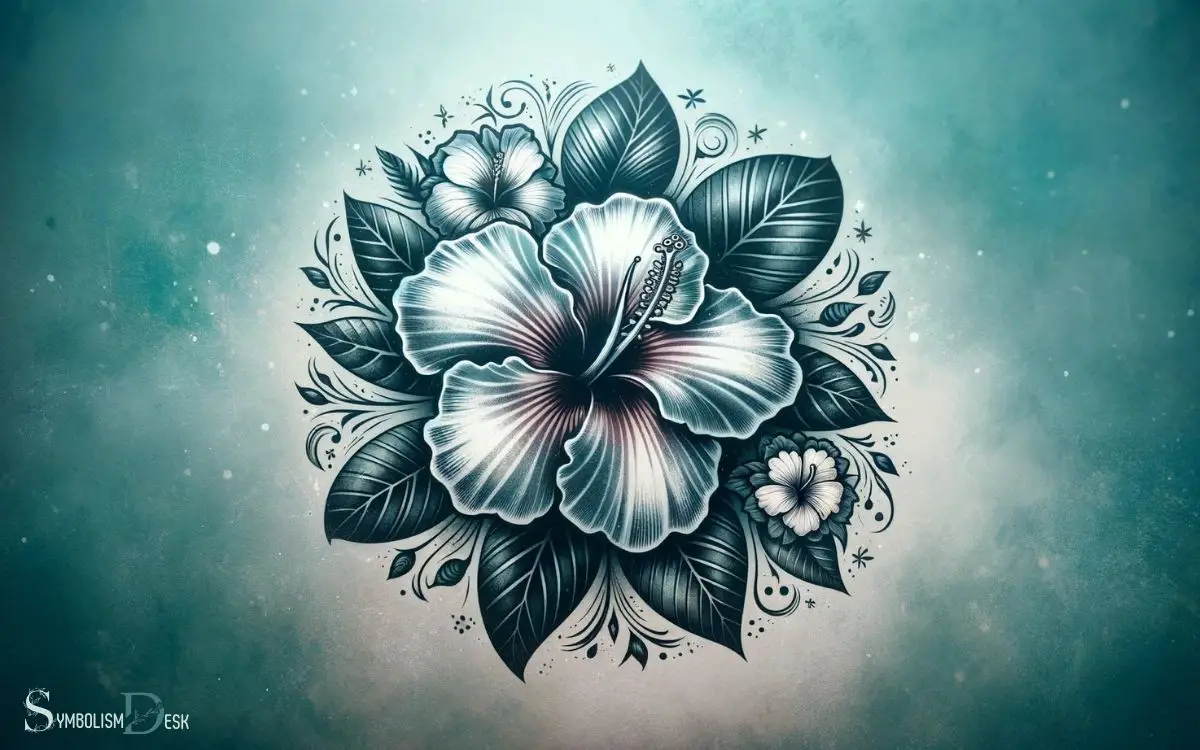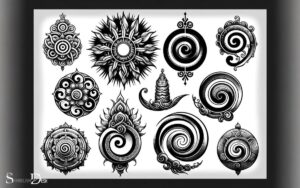What Does a Hibiscus Tattoo Symbolize? Love!
A hibiscus tattoo often symbolizes a variety of meanings including beauty, love, femininity, and the delicate nature of life. In different cultures, it can represent hospitality, the perfect bride, or a connection to ancestors.
It’s a popular choice for those wishing to express their admiration for natural beauty or to capture a personal memory or sentiment.
The hibiscus flower carries distinct symbolism across the world. For instance:
- In Hawaii, the hibiscus is a symbol of hospitality and is often worn by women to indicate their relationship status.
- In South Korea, it represents the immortal love and is often associated with the notion of a perfect bride.
- In China, the hibiscus stands for wealth and fame or the fleeting nature of glory due to its short blooming period.
Additionally, the color of the hibiscus tattoo can further define its meaning:
- A red hibiscus typically signifies love and passion.
- Yellow may stand for friendship and happiness.
- White can symbolize purity and enlightenment.
Embrace the essence of life’s fleeting beauty with a hibiscus tattoo, a timeless emblem of love and elegance.

Key Takeaway
Cultural Significance
While hibiscus tattoos may hold personal meaning for individuals, they also carry significant cultural symbolism.
- In many cultures, the hibiscus flower is associated with delicate beauty, hospitality, and femininity.
- For example, in Hawaiian culture, the hibiscus, known as ‘pua aloalo,’ is often given to visitors as a sign of welcome and hospitality. It’s also commonly used in the making of leis, further symbolizing the spirit of aloha and friendship.
- In South Korea, the hibiscus is the national flower and represents the fleeting nature of beauty and the joy of living in the present moment.
Additionally, in Hindu culture, the hibiscus is associated with the goddess Kali and represents the energy of creation and destruction. These cultural associations add depth and richness to the symbolism of hibiscus tattoos.
Symbolism in Different Cultures
Hibiscus tattoos symbolize different cultural meanings across various societies, adding diverse layers of symbolism to this popular tattoo choice.
- In Hawaiian culture, the hibiscus flower represents delicate beauty and the fleeting nature of life. It’s often associated with femininity, grace, and hospitality.
- In Chinese culture, the hibiscus is a symbol of wealth, fame, and glory. It’s also linked to the concept of delicate beauty, reflecting the fleeting nature of attractiveness.
- In South Korea, the hibiscus is seen as a symbol of the fleeting nature of life and its beauty. It’s also associated with immortality and glory.
The variety of meanings attributed to the hibiscus in different cultures enhances its allure as a tattoo symbol, making it a rich and versatile choice for individuals seeking to express diverse cultural connections.
Love and Romance
In the context of tattoo symbolism, the hibiscus flower holds significant meanings associated with love and romance across various cultures, adding depth and sentiment to its representation.
- In many cultures, the hibiscus is seen as a symbol of love, passion, and delicate beauty.
- In Hawaiian culture, the hibiscus flower is often given as a gift to symbolize a person’s delicate and fragile beauty.
- In Chinese culture, the hibiscus is associated with femininity and is often given to a loved one as a token of affection.
In some cultures, the hibiscus is also linked to the goddess of love and beauty. The vibrant and alluring nature of the hibiscus makes it a popular choice for expressing feelings of love and romance through tattoo art.
Beauty and Femininity
Does the hibiscus tattoo symbolize beauty and femininity across various cultures?
The hibiscus flower has long been associated with beauty and femininity in many cultures around the world. Its delicate petals and vibrant colors are often seen as representations of the beauty and grace of women.
- In Hawaiian culture, the hibiscus flower is often used to symbolize the beauty and charm of the islands, as well as the qualities of hospitality and femininity.
- In India, the hibiscus is associated with the goddess Kali and is seen as a symbol of feminine energy and power.
Across different cultures, the hibiscus tattoo can be a powerful symbol of beauty, femininity, and the diverse qualities attributed to women.
Spiritual and Religious Meanings
The hibiscus flower holds significant spiritual and religious meanings across various cultures and traditions. Its symbolism in spirituality and religion has been revered for centuries, with different interpretations and representations.
Understanding the spiritual and religious significance of the hibiscus can provide insight into the deep-rooted connections between nature, faith, and symbolism.
Hibiscus in Spirituality
One may find that hibiscus tattoos hold spiritual and religious significance for many individuals. The hibiscus flower has various spiritual and religious meanings across different cultures and beliefs.
These meanings include:
- Beauty and Purity: In Hinduism, the hibiscus is offered to deities as a symbol of beauty and purity.
- Femininity and Fertility: In Polynesian cultures, the hibiscus is associated with femininity. It is often worn by women to symbolize fertility and delicate beauty.
- Transformation and Rebirth: In Hawaiian culture, the hibiscus is seen as a symbol of transformation and regeneration. It often represents the cycle of life and death.
- Offerings and Worship: In some spiritual practices, the hibiscus is used in rituals and offerings. It serves as a way to connect with the divine or show reverence.
These spiritual and religious meanings add depth to the symbolism of hibiscus tattoos for those who incorporate them into their body art.
Religious Significance of Hibiscus
Hibiscus tattoos carry religious significance for many individuals due to the flower’s varied spiritual and religious meanings across different cultures and beliefs.
- In Hindu culture, the hibiscus is associated with the goddess Kali and is offered to deities as a symbol of devotion.
- In Hawaiian tradition, the hibiscus is often linked to the goddess Pele, the deity of fire, lightning, wind, and volcanoes. It’s also used in sacred ceremonies and rituals.
- In Christianity, the hibiscus is sometimes referred to as the ‘Rose of Sharon’ and is seen as a symbol of the beauty and perfection of the Virgin Mary.
These diverse religious connections make the hibiscus a powerful symbol for those seeking to express their faith and spirituality through body art.
Personalized Interpretations
Many tattoo enthusiasts personalize the meaning of a hibiscus tattoo to reflect their individual experiences and values.
The personalized interpretations of a hibiscus tattoo can vary widely, but some common themes include:
- Love and Passion: Some individuals may choose a hibiscus tattoo to symbolize love, passion, or romance in their lives.
- Beauty and Femininity: For others, a hibiscus tattoo may represent beauty, grace, and femininity, reflecting personal aesthetic values.
- Transformation and Growth: Some people may interpret the hibiscus as a symbol of personal growth, change, or transformation, representing overcoming challenges or embracing new beginnings.
- Personal Connections: Individuals may also personalize the meaning of a hibiscus tattoo to honor specific memories, relationships, or cultural ties associated with the flower.
Placement and Design Considerations
When considering a hibiscus tattoo, it’s important to think about the placement and design elements.
The symbolism of where the hibiscus is placed on the body can add layers of meaning to the tattoo.
Additionally, color options, meanings, and cultural significance should be carefully considered when designing a hibiscus tattoo.
Symbolism of Hibiscus Placement
As the symbolism of a hibiscus tattoo is deeply tied to its placement on the body, individuals often carefully consider the design and location to convey specific meanings or intentions.
When choosing the placement for a hibiscus tattoo, individuals should consider:
- Visibility: Placing the hibiscus tattoo on areas like the forearm, wrist, or ankle can make it easily visible, symbolizing openness and confidence.
- Privacy: Opting for placement on the back, shoulder, or ribcage can symbolize a more private or personal connection to the meaning behind the hibiscus.
- Size and Detail: Larger areas like the thigh or back allow for more intricate designs, while smaller areas like the wrist or foot may limit the level of detail.
- Cultural Significance: Some individuals may choose placement based on cultural traditions, such as incorporating the hibiscus into a larger Polynesian-themed tattoo.
Transitioning into the subsequent section about ‘color options and meanings’, the choice of hibiscus placement can significantly influence the overall symbolism of the tattoo.
Color Options and Meanings
The color options and meanings of a hibiscus tattoo are crucial considerations in conveying specific symbolism and should be carefully chosen to complement the placement and design of the tattoo. Each color holds its own significance, adding depth to the symbolism of the tattoo.
Red hibiscus flowers symbolize love, passion, and courage, making them a popular choice for expressing strong emotions.
Pink hibiscus flowers are associated with femininity, grace, and gentleness, often chosen to represent beauty and youth.
Yellow hibiscus flowers symbolize happiness, friendship, and positivity, ideal for showcasing a cheerful and optimistic outlook.
White hibiscus flowers represent purity, innocence, and spirituality, often chosen for their serene and calming symbolism.
The color of the hibiscus tattoo, along with its placement and design, can convey a nuanced and personalized meaning.
Cultural Significance in Designs
Cultural significance in hibiscus tattoo designs, including placement and design considerations, plays a pivotal role in conveying the intended symbolism and should be carefully evaluated to ensure the desired cultural representation.
- Placement: Different cultures attribute varying meanings to the placement of hibiscus tattoos. For example, in Hawaiian culture, a hibiscus tattoo on the right ear signifies a person’s relationship status, while on the left ear, it represents the individual’s family and friends.
- Design: The design elements incorporated into the hibiscus tattoo, such as the inclusion of traditional patterns or symbols, can significantly impact its cultural significance. For instance, the addition of Maori patterns can infuse the tattoo with Maori cultural meanings and beliefs.
- Color: Cultural significance can be enhanced through the careful selection of colors. In Chinese culture, red symbolizes good luck and happiness, making it a popular choice for hibiscus tattoos.
Conclusion
As the hibiscus tattoo symbolizes love, beauty, and spirituality, it serves as a reminder of the delicate and fleeting nature of life. Like the flower itself, the tattoo represents the fleeting moments of beauty and passion that should be cherished. The hibiscus tattoo also represents the importance of living in the present moment and appreciating the beauty that surrounds us. It serves as a reminder to embrace love and spirituality in our daily lives, and to find joy in the little things. In contrast, hawk tattoo meanings often convey themes of vision, power, and freedom, reflecting the desire to soar above life’s challenges and obstacles.
It’s a reminder to live life to the fullest and appreciate the beauty that surrounds us, much like the vibrant and colorful hibiscus flower.






